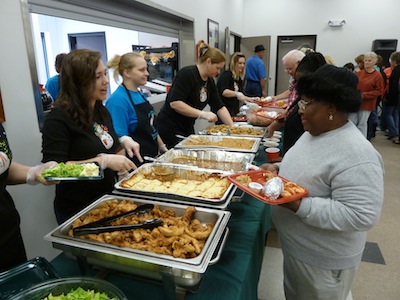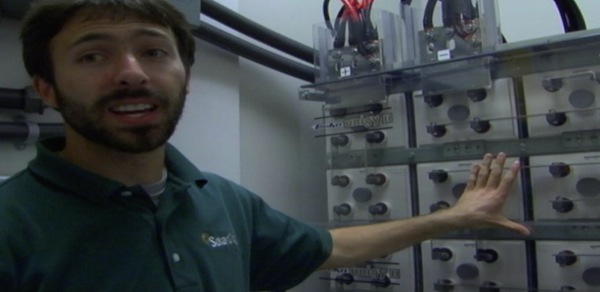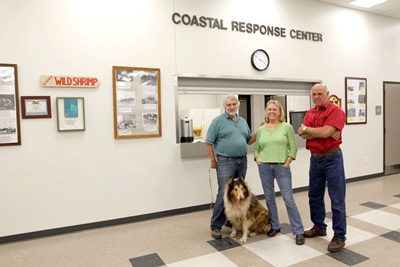Community center now home to one of Alabama’s largest solar power systems
 Coden, Alabama – On Saturday, this small coastal community became home to one of the largest solar power systems in the state of Alabama.
Coden, Alabama – On Saturday, this small coastal community became home to one of the largest solar power systems in the state of Alabama.
The 25,000 kilowatt system, powered by 108 solar panels, was installed in the Coastal Response Center, a hurricane shelter, community center, and home to the local group South Bay Communities Alliance, whose advocacy repaired and renovated the building after Hurricane Katrina.
The $200,000 system is a gift from the Musk Foundation, and SolarCity installed it. When these organizations told the White House they wanted to donate a solar power system to support those impacted by the BP disaster, the Obama Administration pointed them to Coden and the South Bay Communities Alliance (SBCA).
The all-volunteer group advocates for Alabama's coastal communities, which have been largely overlooked in Hurricane Katrina recovery efforts and are now being hit hard by the BP disaster. With this donation, SBCA's board members will no longer have to pay the center's electricity bills, about $500 a month, out of their own pockets. The solar system will generate all the power they need, giving the group a much-needed economic break.
Elie Schecter, the System Design Engineer for SolarCity, explained that when the system generates more energy than the building needs, it sells the excess energy back to the Alabama power company:
“All morning I’ve been going outside to check the meter, because our utility meter is spinning backwards. All morning we’ve been selling power to the Alabama Power Company. And seeing that happen is really a great feeling.”
Paul Nelson, president of the South Bay Communities Alliance, rreported that since Saturday the solar system has already generated over $100 of electricity that SBCA will sell back to Alabama Power!
 Elie Schecter of Solar City shows off the battery back-up for Coden's new solar power system.
Elie Schecter of Solar City shows off the battery back-up for Coden's new solar power system.
In addition to the economic break, community members expressed excitement about bringing clean energy to Coden. Stephenie Bosarge, secretary of SBCA, told the crowd with a grin on her face, "I'm so thankful... It's helping to pull our community together. Who could ever dream lil old Coden, Alabama would have solar power?"
Paul Nelson drew the connection between clean energy and coastal communities' historic relationship to sustainability;
“Like my father and grandfathers before me, and thousands in Alabama’s bayou communities, I have been a ‘farmer of the sea’ for most of my 60 years. My 300-year-old multicultural community is an integral part of the Gulf Coast’s seafood and tourist industries. Because our living and culture depends on coastal waters and estuaries, we have been its natural stewards for generations. Our community’s survival therefore is tied to both the economic and spiritual health of the entire Gulf Coast, indeed of the entire country."
 Zack Carter, Stephenie Bosarge, and Paul Nelson of South Bay Communities Alliance, inside the Coastal Response Center. Photo courtesy of: South Bay Communities Alliance.
Zack Carter, Stephenie Bosarge, and Paul Nelson of South Bay Communities Alliance, inside the Coastal Response Center. Photo courtesy of: South Bay Communities Alliance.
Despite the excitement about the donation, many community members at the event were preoccupied with their ongoing troubles: denied BP claims, a bleak economic future, new health problems.
In attendance were Barbara Robbins, Rosie Robbins, Ana Chau (profiled recently by Bridge The Gulf) and Linda Goleman, who are all living in moldy homes damaged by Katrina, some with rotting floorboards and roofs. Recently, thanks in part to SBCA's advocacy, they were visited by high ranking officials from the Department of Housing and Urban Development. HUD Secretary Shaun Donovan himself visited Linda's home on November 15th.
But later that day, when Secretary Donovan announced that 37 homes in Alabama would receive funding to repair Katrina-related damages, no one from Coden was on the list of homes. Linda expressed frustration and disappointment, saying, "I feel like we were given false hope." She is caring for her disabled grandson Kevin, which has become even harder now that her husband is out of work from the BP disaster, and their claim for economic compensation has been denied.
Zack Carter, a Community Organizer for South Bay Communities Alliance, was one of several speakers to address the large crowd.
Carter gave recognition to Linda Goleman and Barbara Robbins, and explained to the audience why they were understandably frustrated. He pointed out that none of the 300 plus families who qualified in 2007 for a HUD, Mobile County Katrina CDBG were among the 37 families for whom HUD Secretary Shaun Donovan’s announced assistance on November 15th. Carter said that he addressed this issue at the Secretary’s press conference, and the meeting that followed.
Carter said South Bay will continue to advocate for rebuilding funds -- from the federal government to philanthropy – and to lay the basis for long term resiliency by working with community folks committed to building fisher and housing cooperatives.
John Zippert, who has partnered for years with South Bay Communities Alliance, presented a workshop explaining how a housing coop could shield members from land speculators; and a how a multicultural, democratic fisher coop could end the exploitation of crabbers, shrimpers, fisher folk, and oyster-catchers by unscrupulous middlemen who pressure them to accept unfair prices for their catch.
